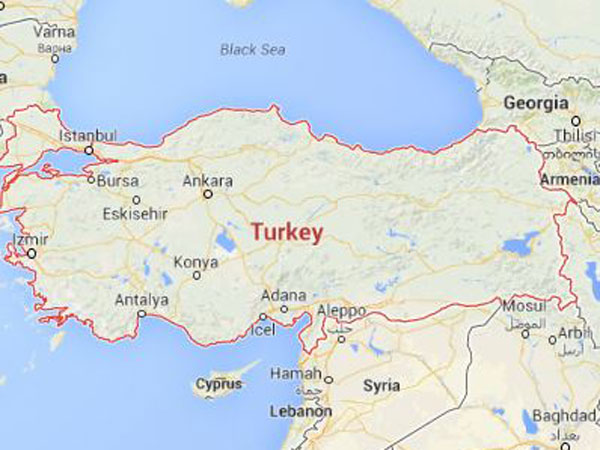
Turkey to host 2017 global innovation conference
Moscow, Sep 22: The historic city of Istanbul in Turkey will be the venue for the 2017 global conference of the International Association of Science Parks and Areas of Innovation, it was announced here on Thursday at the closing of the 33rd annual IASP Conference.
The Spain-headquartered IASP is the largest worldwide network of science parks and areas of innovation, uniting technology parks, business incubators and institutions, and it has a Special Consultative Status with the UN Economic and Social Council (ECOSOC).

The Russian capital this year hosted the four-day IASP Conference for the first time, following its selection as the venue after a global competition. China hosted the conference in 2015.
The IASP's mandate is to contribute to global economic development through innovation, entrepreneurship, and the transfer of knowledge and technology.
Over 1,500 participants from around 70 countries have taken part in the 33rd annual IASP Conference in Moscow, including technopark representatives from Russia, the US, Spain, Britain, Brazil, South Korea, China, Sweden and Italy, among others.
The theme of IASP 2016 is 'The Global Mind: Linking Innovation Communities for Internationalisation, Sustainability and Growth'.
IASP President Jean-Francois Balducchi said they had brought the conference to Moscow for the first time because of Russia's reputation as a leader in the field of science and technology and the fact that these disciplines are flourishing in Russia.
"Science parks and innovative development zones are growing rapidly in Russia. We are a global network and Internationalism is a philosophy with us," he said.
Russia's biggest innovation fund, the Skolkovo Foundation, is the local organiser of the conference here.
Falling global prices of oil -- a major Russian resource -- has made it imperative for the government to accelerate the country's transformation from a resource-intensive to an innovation-based economy. The Russian economy is deep into a recession with Russia's gross domestic product (GDP) in decline for the sixth consecutive quarter.
Created in 2010 by the Russian government, the Skolkovo Foundation runs the Skolkovo City here which houses an innovation centre comprising over 1,500 companies and startups, a Technopark and a new university established in collaboration with the Massachusetts Institute of Technology.
The resident companies in the Startup Village conduct research in diverse fields ranging from information technology and robotics, space, energy-efficiency technologies and new materials.
The overall manifesto of the Skolkovo Foundation is to help its resident tech startups commercialise their products.
"The cumulative revenue of Skolkovo's start-ups through January 2016 reached $1.6 billion. They brought in more than $350 million in investment, creating 18,000 jobs and filing over 1,900 patent applications along the way," Skolkovo said in a release here.
At a Skolkovo City research lab, this correspondent came across Prasantha Reddy Mudimela from Bengaluru, who is a senior researcher here working on Carbon Nanotubes (CNTs).
Like diamond and graphite, CNTs are an allotrope, or a different form, of carbon with a cylindrical nanostructure. Owing to the material's exceptional strength, these cylindrical carbon molecules are valuable for nanotechnology, electronics, optics and other fields of materials science and technology.
CNTs, which were first written about by Soviet chemical scientists in the early 1950s, are forecast to make a large impact in electronics applications by 2020. They are likely to be used for fabrication of the next generation of energy storage, supercapacitors, field emission transistors, photovoltaics, and biomedical devices and implants.
Prasantha also elaborated on another device that he is working with -- a solar simulator. Also known as artificial sun, this simulator provides illumination approximating natural sunlight. The purpose of the solar simulator is to provide a controllable indoor test facility under laboratory conditions, used for the testing of solar cells, sun screen, plastics, and other materials and devices.
Another significant research being done here by the Skolkovo Robotics Centre is on human exoskeletons, which can augment human abilities and enable disabled people to walk again. Apart from military use, exoskeletons could have numerous civilian applications. Medical skeletons could assist the movement of injured or disabled patients, while construction workers could benefit from the ability to lift greater loads.
The idea of the exoskeleton is borrowed from nature, wherein insects, crustaceans and other invertebrates use hard external casings to support and protect themselves.
The main function of a powered exoskeleton is to assist the wearer by boosting their strength and endurance. They are commonly designed for military use, to help soldiers carry heavy loads both in and out of combat.
Russian scientists and engineers are also engaged in developing the technology of bionic exoskeleton suits controlled by the human brain.
IANS
bc/ksk/dg


 Click it and Unblock the Notifications
Click it and Unblock the Notifications


































